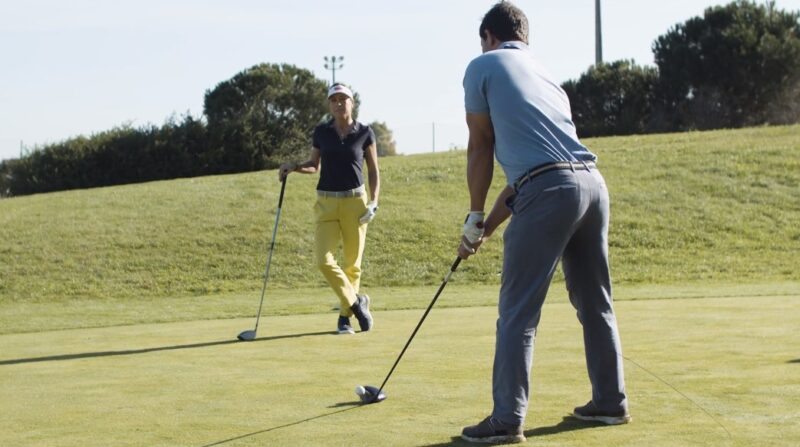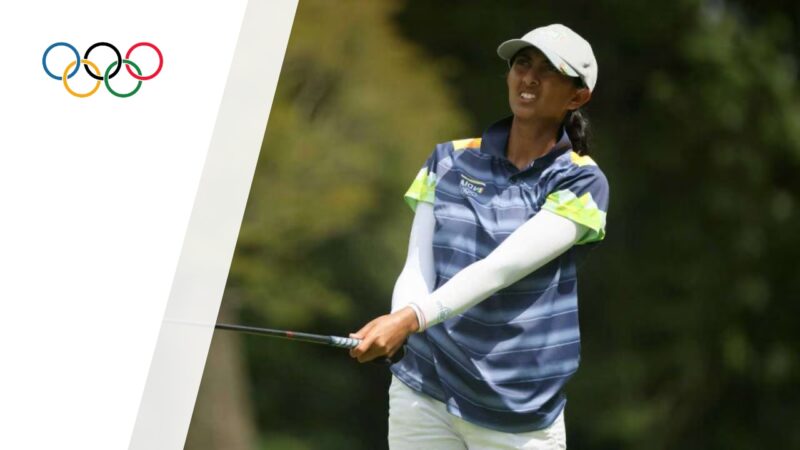The gentle precision of golf, with its peaceful greens and focused players, seems a world away from the hustle and intensity of the Olympics. Yet, the intertwining of golf and the Olympics has an intricate history, revealing a tale of passion, politics, and persistence.
Whether you’re an avid golf enthusiast, a budding player, or someone who enjoys the occasional putt-putt game, this article will guide you through golf’s Olympic journey.
The Historical Link

Early Beginnings: The 1900s Debut
The year was 1900. As the world eagerly anticipated the second modern Olympic Games in Paris, golf made its Olympic debut. There were two events: one for men and one for women.
- The men’s event saw Charles Sands of the USA claim the gold.
- The women’s event was won by Margaret Abbott, making her the first American woman to win an Olympic event.
This historical moment, however, was brief. Only a handful of competitors participated, and the recognition was somewhat overshadowed by the larger events of the Games.
Last Appearance Before a Century’s Gap: St. Louis 1904
Just four years after its debut, golf appeared again in the 1904 St. Louis Olympics. This time, the competition was male-only and featured teams rather than individual players.
- The United States dominated, with Canadian George Lyon upsetting the home favorites to grab the gold in the individual event.
Sadly, after the St. Louis Games, golf disappeared from the Olympics for over a century. The reasons varied, from logistical difficulties to disputes over the amateur status of players.
The Modern Era

The Return in 2016: Rio de Janeiro
After a 112-year absence, golf was reinstated in the 2016 Rio Olympics. The decision to bring back golf was met with a mix of excitement and skepticism.
- The format chosen was a 72-hole stroke play for both men and women, similar to most professional tournaments.
- The course was a newly constructed Olympic Golf Course designed specifically for the Games, addressing concerns about its environmental impact.
It was a spectacle, witnessing the world’s best players compete for national pride. British golfer Justin Rose secured the gold for the men, while South Korea’s Inbee Park did the same for the women.
Continuation in Tokyo 2020 and Beyond
Golf retained its spot in the 2020 Tokyo Olympics. While the format remained unchanged, the event showcased the evolution of the sport.
- The competition was fierce, reflecting the ever-growing talent pool in the world of golf. American golfer Xander Schauffele clinched the gold for the men and Nelly Korda for the women.
- Moreover, the Tokyo event was a testament to golf’s growing global appeal, with players from countries not traditionally known for golf making their mark.
The future looks promising for golf in the Olympics. The sport’s inclusion in the Paris 2024 Games has already been confirmed, ensuring that the legacy of golf in the Olympics continues.
Why Golf in the Olympics Matters
Global Exposure
Golf, traditionally seen as a sport of the elite, has expanded its horizons. The Olympics plays a crucial role in this transformation.
- By being on this global stage, golf reaches countries and communities unfamiliar with its charm.
- Emerging talents from diverse backgrounds get the opportunity to shine, challenging the sport’s traditional narratives.
Values
The Olympics is not just about medals; it’s about bringing nations together, fostering respect, and promoting excellence.
- Golf in the Olympics reflects these values, emphasizing sportsmanship, camaraderie, and the pursuit of excellence.
- The unique pressures and pride of playing for one’s country add a distinct flavor to Olympic golf, different from the regular tours.
The Players’ Perspective

While golf has its own set of prestigious tournaments – the Majors – the Olympics offers a unique allure.
- Winning a Major is a personal achievement and solidifies a golfer’s legacy within the sport.
- An Olympic medal, on the other hand, carries the weight of national pride. Players often describe the feeling of representing their country as unparalleled, making the pursuit of Olympic gold a distinct honor.
The Challenge of a Different Format
The Olympics provides a unique challenge for golfers accustomed to the regular professional circuit.
- Unlike the team dynamics in events like the Ryder Cup, the Olympics is predominantly an individual endeavor.
- The Olympic course is specially curated for the event, making it a novel challenge even for seasoned players. This uniqueness pushes players to adapt and strategize differently than they would for familiar Major venues.
Global Impact
The global platform of the Olympics has the potential to inspire budding golfers in countries where the sport is not traditionally popular.
- Telecasts of Olympic golf matches introduce the game to millions who might not typically tune into regular golf tournaments.
- As a result, countries might invest more in developing golf infrastructure and training, inspired by the success stories of their Olympic representatives.
Role Models and Representation
Olympic golf gives a stage to players from diverse backgrounds, thus promoting inclusivity.
- Having a wide range of nationalities represented means that young aspirants from all over the world can have role models they relate to.
- For instance, the success of players like India’s Aditi Ashok in the Tokyo 2020 Olympics has inspired countless young players in regions where golf is still emerging
FAQs
How are golfers selected to represent their countries in the Olympics?
Golfers are typically selected based on the World Golf Rankings. Each country can send up to two players for each of the men’s and women’s competitions.
If a country has more than two players in the top 15 of the rankings, they can send up to four players. This ensures that the best players from each country get a chance to represent their nation.
Are professionals allowed to compete in Olympic golf, or is it just for amateurs?
Yes, professionals are allowed to compete. This differs from the early Olympic Games, where only amateurs could participate. Now, the event attracts top professional players from around the globe, making the competition even more intense.
Is there a team format in Olympic golf similar to the Ryder Cup or the Presidents Cup?
No, the current format of golf in the Olympics is individual stroke play. While the 1904 St. Louis Olympics did feature a team format, the modern Olympic golf format focuses solely on individual competition.
How many rounds are played in Olympic golf, and how does it differ from major tournaments?
Olympic golf consists of four rounds, similar to major tournaments. The difference lies in the course and the fact that players are competing for national pride in the Olympics, whereas major tournaments are often about individual achievement and ranking points.
Are there any specific rules or regulations unique to Olympic golf?
While the core rules of golf remain consistent, Olympic golf has certain regulations related to player eligibility, selection criteria, and tie-breaking procedures that might differ from other professional golf tournaments.
Has any golfer ever won both a Major Championship and an Olympic gold medal in the same year?
Yes, this is a rare feat, but it has been achieved. For example, Inbee Park of South Korea won the Women’s British Open and the Olympic gold medal in 2016.
This showcases the exceptional talent and consistency of players who can perform at the highest level in both formats.
Final Words
The addition of golf to the Olympic roster isn’t just about adding another sport to the list. It’s about global expansion, diversification, and bringing the spirit of the Olympics to the greens. It offers players a unique experience and challenges them in new ways.
For the audience, it’s an opportunity to witness the fusion of national pride with individual prowess. The road of golf in the Olympics has been winding, but its future, undoubtedly, looks bright and promising. We cover topics regarding the Olympics, so make sure to revisit our website for more information.
